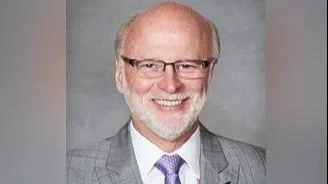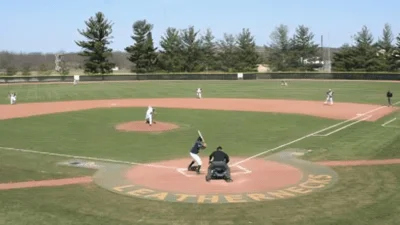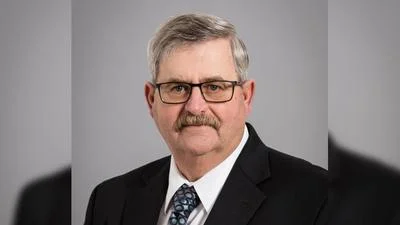Rep. Tim Butler (R-Springfield) asked more than a few questions during a hearing Tuesday on decriminalizing cannabis in Illinois.
“Can you tell me anecdotally as a resident of Denver, when you walk out the door everyday what are you seeing since this (legalization of marijuana) became an act?” Butler asked Colorado Rep. Dan Pabon (D-Denver) during testimony at Tuesday’s House and Senate joint committee hearing on the Economic Development and the Cannabis Regulation and Taxation Act.
“Is it the same Denver, Colorado, you had before, or is it a bunch of zombies wandering around?” Butler added. “Seriously, I think we would all like to know how this has affected the life of the residents of Colorado.”
Rep. Tim Butler
“I think it is a great question, and I can honestly say there is no discernible impact I can tell from the legalization of marijuana on anyone’s quality of life, demeanor or attitude, or overall enjoyment or happiness,” Pabon answered.
If passed, SB316 and HB2352, respectively sponsored by Sen. Heather Steans (D-Chicago) and Rep. Kelly Cassidy (D-Chicago), would legalize marijuana in Illinois, making it the ninth state, along with Washington, D.C., to decriminalize the drug.
Butler asked witness and co-founder of the Marijuana Policy Group Adam Orens what the single sale price, of the total $1.6 billion consumer purchase price, was in the 2016 fiscal year. According to the economist and public policy expert, an average transaction at a cannabis dispensary is $50 to $80.
But Butler’s questions did not stop there.
“What are the guidelines for the purchase?” Butler asked. “Is it a higher amount for nonresidents?”
Oren explained sales have changed since the product was legalized in 2014, noting nonresidents are now allowed to purchase 1 ounce of the product per transaction opposed to the quarter-ounce they were limited to buying in an individual sale four years ago.
“Do dispensaries track what states they (nonresidents) come in from,” Butler asked.
According to Orens, no official data is available.
“I think each dispensary location may know more than others depending on what they do,” Oren said, adding more sales can be seen in tourist areas opposed to residential area sales.
Butler’s last question was about banking.
“Marijuana is still a schedule one drug, and a lot of folks are concerned about the banking regulations” Butler said. “Can you talk a little bit about how Colorado has addressed the issues when it comes to the banking industry?”
Pablon said that with no real policy in place, Colorado has relied on local banks turning a blind eye or cannabis companies inconspicuously advertising the sale of the federally barred product.
“There is an interest in essentially using the state as the banking entity for these industries,” Pabon said, adding it would require a third-party vendor to facilitate the transactions, which would require legislation that Colorado lawmakers expect to pass next year. Until then, the Colorado representative assured Butler all is well with the legalization of cannabis in Colorado.
“Our work-life balance hasn’t changed,” Pabon said. “We have a a 2.3 percent unemployment rate right now, so it is not like people are sitting on the couch getting stoned and eating Cheetos and Goldfish forgetting that they have to go to work.”
Butler ended his lengthy query noting no matter how much data accumulated on the highly controversial issue, “both sides of those on the issue are going to see whatever side they want to see out of it.”
.jpg)





 Alerts Sign-up
Alerts Sign-up